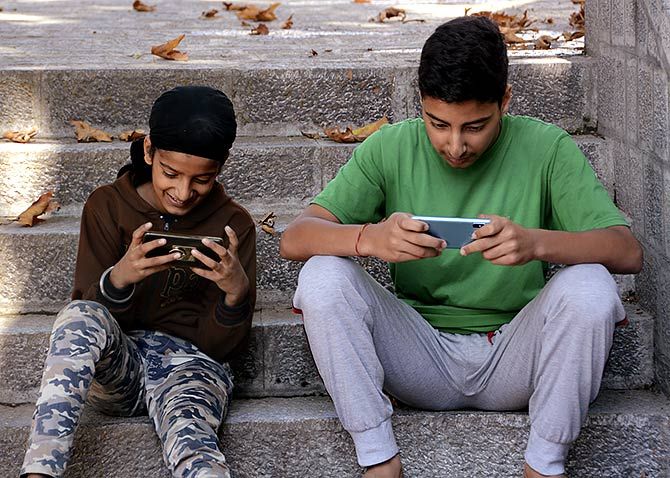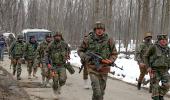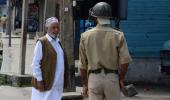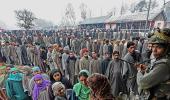'The return of violence in Kashmir justifies government precautions, but risk has to be taken.'
'We need to act and ensure that risk is converted to gain through direct interaction with Kashmir's public,' says Lieutenant General Syed Ata Hasnain (retd).

The opening of mobile communication in Kashmir three days ago, albeit without Internet, was welcomed by almost all observers of the security situation.
However, the cessation of SMS facility in its wake seems to have marred the celebration.
It happened because of the incident involving the waylaying of a Rajasthan registered apple laden truck by terrorists in the apple growing district of Shopian.
The driver was killed, some apple orchard workers were beaten up, the truck set on fire and the driver's assistant barely managed escape.
This was the first major reported terrorist related atrocity in some months, particularly from an area well known for abduction and killing of policemen and on leave soldiers.
Two days later, another such incident was reported from village Trenz in the same district.
That a bounce back would be attempted by the forces of disruption was expected and that is exactly what is happening. Everyone is relating the atrocity literally to the opening of mobile communication.
That is not entirely right, but there is a contrived linkage here.
Every effort will be made by disruptive forces, under the directions of Pakistan's deep state, to prevent the return of normality.
With the reasonable success gained by the Indian establishment in dismantling the varied structures of the eco-system which remains the heart of the terror resurgence capability, there aren't too many other ways to demonstrate lack of normalcy.
If nothing is seen to be happening in terms of resistance the relevance of the separatists and the terrorists will rapidly erode. Apples, tourism and mobile communication remain three domains which can be exploited./p>
What is the importance of apples?
Recently there have been some excellent pieces of research on the apple industry of Kashmir, outlining increase and decrease in production in sync with the security situation in the last few years, and comparisons with other apple producing states.
In 2011, I can recall my advice to the state government. It primarily focused on creation of conditions for maximising the production of apples by creating a secure environment for 24x7 attention to the orchards.
Our assessment was that Rs 3,000 crores worth of apples leaving Kashmir would bring sufficient money to pockets starved by three years of agitation.
A basic rationale always applicable to such hybrid conflict situations is that when money jingles in pockets people hesitate from coming into the streets to do illegal activities.
As long as government's vigilance organisations can ensure that none of this money reaches the wrong pockets there will be peace.
For the disrupters, apples provide the means to demonstrate their diktat in preventing a Kashmiri product reaching India, bizarre as it may sound.
The vulnerable elements are numerous; apple contractors who roam around negotiating bulk purchases, apple orchard owners and workers who work even during nights, and truck drivers and assistants with over a hundred thousand trucks entering and leaving Kashmir during the apple season.
Tourism is the other peace facilitator. If the eco-system of terror and street agitation is kept dismantled, only sporadic events may occur but rarely any big ones.
Public memory for such things is not long and tourists will come flocking back. Rarely have separatists or other disruptive elements targeted tourists in Kashmir. largely because the daily bread of the public being targeted was never taken kindly by people.
This could, however, change when disruptive elements have little qualms about the nature of their targets of violence and no focused strategy.
They may just treat tourists as soft targets and force the public to suffer as a kind of coerced penance in protest against India.
Currently there are reports that some segments of the public in Kashmir are expressing their sense of alienation and indulging in a form of voluntary 'satyagraha' denying themselves even basic amenities available due to improvement in the situation.
The prime example is parents refusing to send their children to school despite these being open for some time. In fact, it was the domain of education which was freed from restrictions the earliest.
This indicates a higher than previously felt angst at any time. It can translate into triggered violence with instigation and presence of a visible leadership.
The government has ensured that neither is their a leadership available nor the means to rally support for mass violence; with mobile Internet, especially social media not facilitated.
Strangely mobile communication with Internet is being mentioned in various commentaries as a basic human right, on the precept of right to communicate and the right to express.
It is a means of business for many in current times, leading to loss of livelihood. Among all other forms of restriction imposed by the government to control the situation, it is this domain which has caught the fancy of the international media and led to much criticism of the government.
However, the government has fair justification for this.
The experience of just a few years ago reveals that most efforts at subversion, attempts to rally resistance mobs and coordination of various criminal acts by separatists and terrorists, were based upon mobile Internet connections using social media.
The penetration of this society has exponentially increased since 2008-2010 and 2016 when domains of mobile communication were extensively used to instigate and coordinate violence.
There are enough examples of international experience in this sphere, starting with Egypt's famous Tahrir Square agitation of the Arab Spring in 2011 and 2013, the Taksim Square agitation in Turkey and the various activities in Ukraine in 2014.
Surprisingly international media never mentions this and how legitimately constituted governments are often coerced through means of social media on mobile Internet.
Of course this can hardly be complete without mentioning the capability of Pakistan to conduct and influence operations on the local Kashmiri population to keep them in a state of subverted alienation.
Yet, despite all that has been said above as justification for controls on communication will fly in the face if it is kept in place inordinately long.
The prime minister's ability to handle it internationally has been effective, but shortly voices of dissent will rise and once they do a rapid change will be witnessed.
We need to act well before that, ensuring that risk is converted to gain through direct interaction with Kashmir's public.
Lieutenant General Syed Ata Hasnain (retd) is the former GOC 15 and 21 Corps and one of India's leading strategic analysts.











 © 2025
© 2025